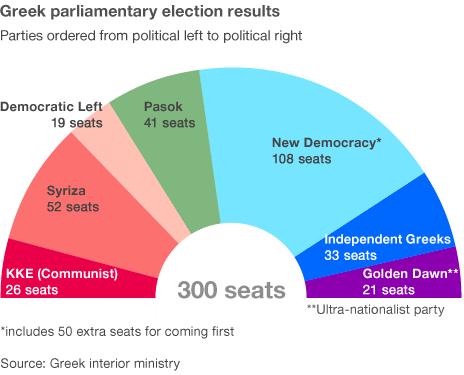No breakthrough in Greek coalition talks
- Published
Greek citizen: "I am very scared they will not be able to succeed with the coalition"
Negotiations on forming a new Greek government have ended after an hour but will resume on Tuesday.
Three previous attempts to form a government have failed. If the parties cannot agree on a coalition, new elections must take place next month.
The left-wing Syriza bloc - the second largest in parliament - did not attend the talks, saying it would not join any coalition making further cuts.
Syriza rejects the terms of the EU/IMF bailout, which demand more austerity.
"Things are very difficult. I'm not optimistic," said Evangelos Venizelos, leader of the Socialist Pasok party, after the talks, according to the Reuters news agency.
A majority of Greek voters backed parties opposed to the austerity needed to meet the terms of the 130bn euro ($170bn; £105bn) bailout agreed with the EU and International Monetary Fund (IMF).
European markets and the euro fell sharply on Monday. The euro stood at $1.2845, down 0.54% from Friday.
The leaders of the centre-right New Democracy, Pasok and moderate Democratic Left parties arrived at the presidential palace shortly after 19:30 (16:30 GMT) on Monday for talks.
They left an hour later. President Karolos Papoulias called another round of talks for Tuesday, to include all parties except the far right.
Mr Papoulias has proposed a technocratic government.
Syriza's leader Alexis Tsipras rejected the invitation from the Greek president to join the coalition talks on Monday, saying he would not be a party to what he called a crime.
The BBC's Mark Lowen in Athens says the chances of success at this 11th hour are slim.
Failure would mean fresh elections which, polls suggest, could usher in a government that turns its back on Greece's bailout.
That could lead the country into a default on its debt and hasten Greece's departure from the euro, our correspondent says.
Syriza opposes any further spending cuts and wants to renegotiate the bailout package.
Eurozone finance ministers warned on Monday that Athens must stick to the terms of the bailout if it wants to receive further injections of funds to stave off state bankruptcy and avoid leaving the euro.
The chairman of the eurozone group, Luxembourg Prime Minister Jean-Claude Juncker said he was "strongly against" a Greek exit from the single currency, calling the suggestion "nonsense" and "propaganda".
"But the Greek public, the Greek citizens, have to know that we agreed on a programme and this programme has to be implemented," Mr Juncker told a news conference in Brussels.
The Dutch finance minister said Greece had "no option" but to reform, while Austria said Greece would have to leave the EU in order to leave the euro.
"Greece would have to reapply and then we would have membership negotiations and look very closely whether Greece would be able to become a member at all," Austrian Finance Minister Maria Fekter said.
A majority of Greek voters backed anti-austerity parties in the elections earlier this month. As well as Syriza, these include the Democratic Left, the KKE (Communists) and the far-right Golden Dawn.
Pasok and New Democracy, which signed up to the bailouts and had previously dominated Greek politics for decades, saw their combined share of the vote drop from about 77% to about 33%.
Recent opinion polls suggest Syriza's support has increased since 6 May and it could come first in any new election.
One poll commissioned by the Eleftheros Typos newspaper and published on Monday showed 20.5% of support for Syriza, compared to 19.4% for New Democracy and 11.8% for Pasok.
